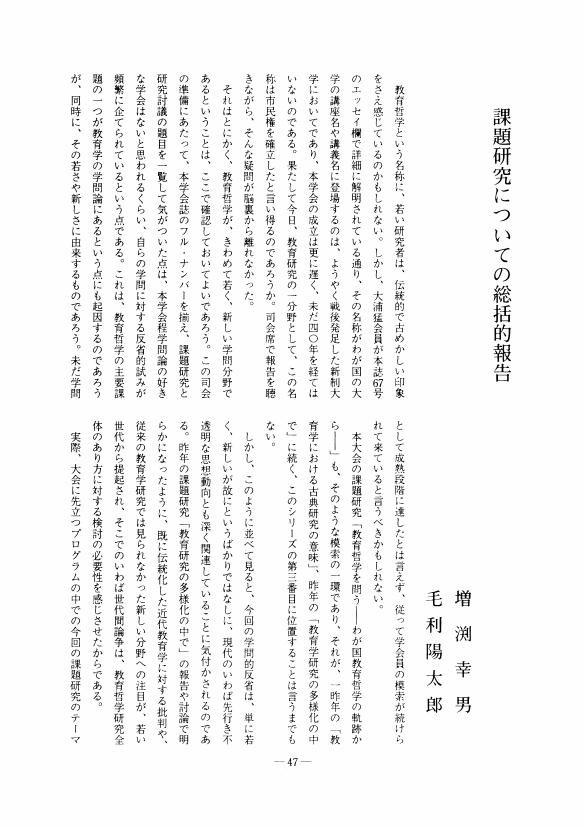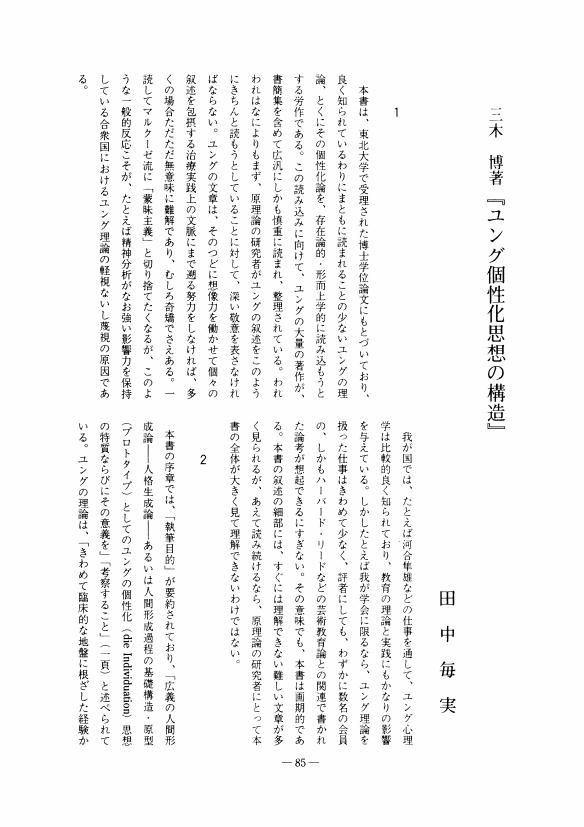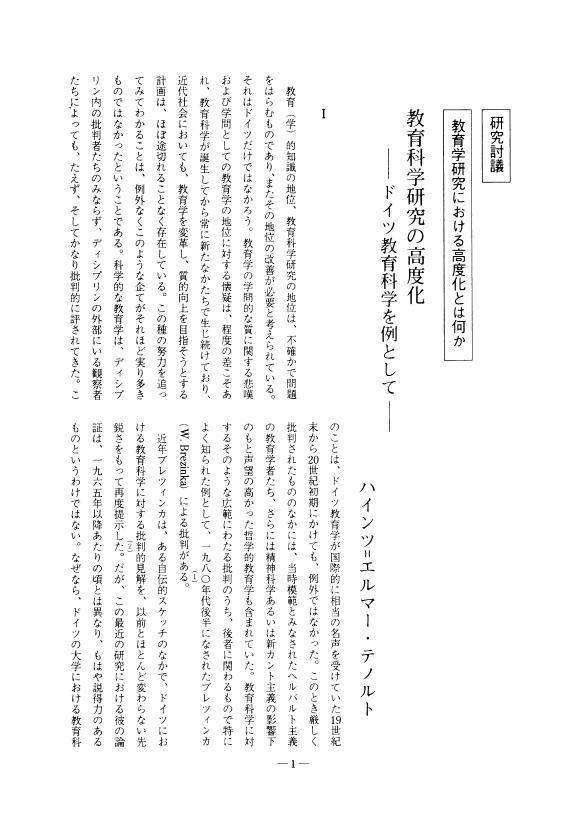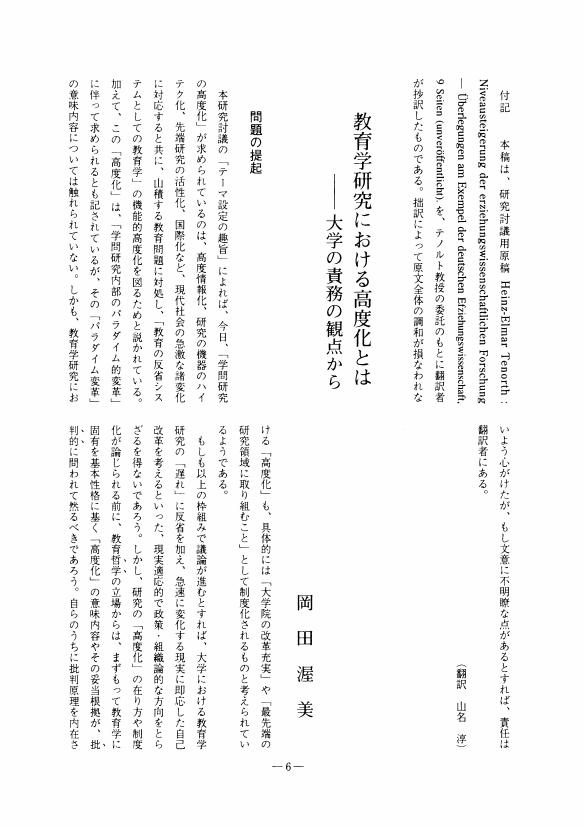- 著者
- 青木 英実
- 出版者
- 教育哲学会
- 雑誌
- 教育哲学研究 (ISSN:03873153)
- 巻号頁・発行日
- vol.1996, no.74, pp.1-15, 1996-11-10 (Released:2010-01-22)
- 参考文献数
- 81
K.R.Popper, one of the greatest philosophers of this century, has exerted some influence upon contemporary philosophy, science, politics and education. During his early years at Vienna, he received training in education and child-psychology for a future school teacher. The current paper aims to explicate the relationship of Popper's philosophy and the thought of the “Wiener educational reform”, especially that of G. Kerschensteiner.Popper criticized the logic and psychology of induction, along with the theory of verification, of the “Wiener Kreis.” This criticism of inductive logic was closely related with his early study of education and child-psychology. In his early articles Popper opposed the contemporary teaching method which had been based upon the Herbartian associationism. Both the logic of induction and the teaching method of associationism had rested upon the “bucket theory” of knowledge, where knowledge was regarded as consisting of atomic experiences or molecular elements. In opposition to such a theory of knowledge and learning, Popper asserted that all human learning consisted in the modification of previous knowledge or of disposition. Here Popper's theory of knowledge shared something in common with the ideas and motif of the educational theory of the “Wiener educational reform.” Thus the activistic view of the child and of education of the “New Education” in 20th century Europe, had a great impact on the contemporary philosophy and thought in general, through the philosophy of K.R.Popper.
1 0 0 0 OA ピータースにおける「教育哲学」の構想 イギリス分析的教育哲学の基底
- 著者
- 谷田 増幸
- 出版者
- 教育哲学会
- 雑誌
- 教育哲学研究 (ISSN:03873153)
- 巻号頁・発行日
- vol.1996, no.74, pp.16-28, 1996-11-10 (Released:2009-09-04)
- 参考文献数
- 47
The current paper intends to present a new interpretation of the philosophical articles by R S. Peters, a major analytic philosopher of education, by doing away with the major previous preconceptions concerning his position.The present author proceeds as fellows ; (1) to extract the framework of Peters' philoso-phy of education as a whole, by analyzing Ethics and Education, his major work ; (2) to clarify the characteristics of the normative problems which arise inevitably from his analysis of the concept of “education”; (3) to compare the normative basis of his philosophy of education and the normative basis of Dewey's theory, by taking up Peters' critical comment on the latter ; (4) to examine Peters' point of view on the movement of analytic philosophy of education since the 1960s, by scrutinizing his retrospective articles. Through these considerations, the present author clarifies the truth of Peters' normative aspect which he has maintained right from the beginning of his philosophical career. At the same time, the author separates out those foundations of the analytic philosophy of education in Britain-the historical particulars, the soil, the climate and so on-upon which his philoso-phy had depended.
1 0 0 0 OA デユーイ考
- 著者
- 杉浦 宏
- 出版者
- 教育哲学会
- 雑誌
- 教育哲学研究 (ISSN:03873153)
- 巻号頁・発行日
- vol.1996, no.74, pp.29-42, 1996-11-10 (Released:2009-09-04)
1 0 0 0 OA 「戦後五十年」の教育を顧みて
- 著者
- 金谷 茂
- 出版者
- 教育哲学会
- 雑誌
- 教育哲学研究 (ISSN:03873153)
- 巻号頁・発行日
- vol.1996, no.74, pp.43-44, 1996-11-10 (Released:2009-09-04)
1 0 0 0 OA ドイツ教育学との交流-ベルリン滞在報告
- 著者
- 今井 康雄
- 出版者
- 教育哲学会
- 雑誌
- 教育哲学研究 (ISSN:03873153)
- 巻号頁・発行日
- vol.1996, no.74, pp.45-52, 1996-11-10 (Released:2009-09-04)
1 0 0 0 OA 第一回日=独フレーベル会議について
- 著者
- 小笠原 道雄
- 出版者
- 教育哲学会
- 雑誌
- 教育哲学研究 (ISSN:03873153)
- 巻号頁・発行日
- vol.1996, no.74, pp.53-55, 1996-11-10 (Released:2009-09-04)
1 0 0 0 OA 教育研究のあり方を総合的に見直す視点から
- 著者
- 堀尾 輝久
- 出版者
- 教育哲学会
- 雑誌
- 教育哲学研究 (ISSN:03873153)
- 巻号頁・発行日
- vol.1996, no.73, pp.29-41, 1996-05-10 (Released:2009-09-04)
- 参考文献数
- 11
1 0 0 0 OA 教育哲学の未来
- 著者
- 矢野 智司
- 出版者
- 教育哲学会
- 雑誌
- 教育哲学研究 (ISSN:03873153)
- 巻号頁・発行日
- vol.1996, no.73, pp.42-46, 1996-05-10 (Released:2009-09-04)
- 参考文献数
- 3
1 0 0 0 OA 課題研究についての総括的報告
- 著者
- 増渕 幸男 毛利 陽太郎
- 出版者
- 教育哲学会
- 雑誌
- 教育哲学研究 (ISSN:03873153)
- 巻号頁・発行日
- vol.1996, no.73, pp.47-50, 1996-05-10 (Released:2009-09-04)
1 0 0 0 OA ルソーにおける利己的情念と「人間の本源的善性」論
- 著者
- 坂倉 裕治
- 出版者
- 教育哲学会
- 雑誌
- 教育哲学研究 (ISSN:03873153)
- 巻号頁・発行日
- vol.1996, no.73, pp.51-64, 1996-05-10 (Released:2010-01-22)
- 参考文献数
- 29
Cet article se propose de réduire le décalage entre les recherches spécialisées et l'image commune concernant la pensée pédagogique de J. -J. Rousseau. On dit souvent que Rousseau, confiant en “la bonnté originelle” de l'enfant, se fait l'apôtre d'une “éducation négative”, qui exclut les pressions et les directive par les adultes. D'autre part, des spécialistes insistent sur le fait que la volonté de l'élève est sous l'emprise du gouverneur omnipuissant dans l'Emile. Nous pensons que cette lecture commune surestime l'argument de “la bonté originelle”. Pour démontrer cet argument, Rousseau distingue “l'amour de soi” absolument bon et naturel d'avec “l'amour-propre”, forme modifiée ou dépravée du premier. On interprète souvent “l'amour de soi” comme le principe de toute léducation d'Emile. Il faut remarquer cependant que “l'amour-propre” peut être investi de valeurs positives chez Rousseau. En ôtant toutes les relations artificielles acquise dans la société pour introduire “l'amour-de soi” comme une forme spéciale de “l'amour-propre”, Rousseau critique les jus-naturealistes modernes qui approuvent les passions interéssées et les théologiens qui nient l'amour-propre par l'invocation du péché originel; les uns et les autres coucluent, par une route opposée, que la société telle qu'elle est est nécessaire, soit pour satisfaire les désirs humains, soit pour maintenir l'ordre social. Cette critique qui se fonde sur “la bonté originelle”, n'est qu'un préparatif pour “la vraie éducation” qui envisage de faire former uc nouveau par l'élève des relations convenables avec les autres êtres selon le développement de ses facultés.
1 0 0 0 OA 「教養」の復権を求めて
- 著者
- 長井 和雄
- 出版者
- 教育哲学会
- 雑誌
- 教育哲学研究 (ISSN:03873153)
- 巻号頁・発行日
- vol.1996, no.73, pp.65-76, 1996-05-10 (Released:2009-09-04)
1 0 0 0 OA 教育哲学を考える
- 著者
- 甲斐 進一
- 出版者
- 教育哲学会
- 雑誌
- 教育哲学研究 (ISSN:03873153)
- 巻号頁・発行日
- vol.1996, no.73, pp.77-78, 1996-05-10 (Released:2009-09-04)
1 0 0 0 OA 浜田栄夫著『表象理論とヘルバルト』
- 著者
- 鈴木 晶子
- 出版者
- 教育哲学会
- 雑誌
- 教育哲学研究 (ISSN:03873153)
- 巻号頁・発行日
- vol.1996, no.73, pp.79-84, 1996-05-10 (Released:2009-09-04)
1 0 0 0 OA 三木 博著『ユング個性化思想の構造』
- 著者
- 田中 毎実
- 出版者
- 教育哲学会
- 雑誌
- 教育哲学研究 (ISSN:03873153)
- 巻号頁・発行日
- vol.1996, no.73, pp.85-91, 1996-05-10 (Released:2009-09-04)
- 著者
- 宮寺 晃夫
- 出版者
- 教育哲学会
- 雑誌
- 教育哲学研究 (ISSN:03873153)
- 巻号頁・発行日
- vol.1996, no.73, pp.92-93, 1996-05-10 (Released:2009-09-04)
1 0 0 0 OA 沼田裕之著『教育目的の比較文化的考察』
- 著者
- 宮寺 晃夫
- 出版者
- 教育哲学会
- 雑誌
- 教育哲学研究 (ISSN:03873153)
- 巻号頁・発行日
- vol.1995, no.72, pp.62, 1995-11-10 (Released:2009-09-04)
1 0 0 0 OA 村田 昇編『シュプランガーと現代の教育』
- 著者
- 米山 弘
- 出版者
- 教育哲学会
- 雑誌
- 教育哲学研究 (ISSN:03873153)
- 巻号頁・発行日
- vol.1995, no.72, pp.63, 1995-11-10 (Released:2009-09-04)
1 0 0 0 OA 教育学研究における高度化とは何か 教育科学研究の高度化-ドイツ教育科学を例として-
- 著者
- ハインツ=エルマー テノルト
- 出版者
- 教育哲学会
- 雑誌
- 教育哲学研究 (ISSN:03873153)
- 巻号頁・発行日
- vol.1996, no.73, pp.1-6, 1996-05-10 (Released:2009-09-04)
- 参考文献数
- 6
1 0 0 0 OA 教育学研究における高度化とは 大学の責務の観点から
- 著者
- 岡田 渥美
- 出版者
- 教育哲学会
- 雑誌
- 教育哲学研究 (ISSN:03873153)
- 巻号頁・発行日
- vol.1996, no.73, pp.6-12, 1996-05-10 (Released:2009-09-04)
- 著者
- 堀内 守
- 出版者
- 教育哲学会
- 雑誌
- 教育哲学研究 (ISSN:03873153)
- 巻号頁・発行日
- vol.1996, no.73, pp.13-17, 1996-05-10 (Released:2009-09-04)
















